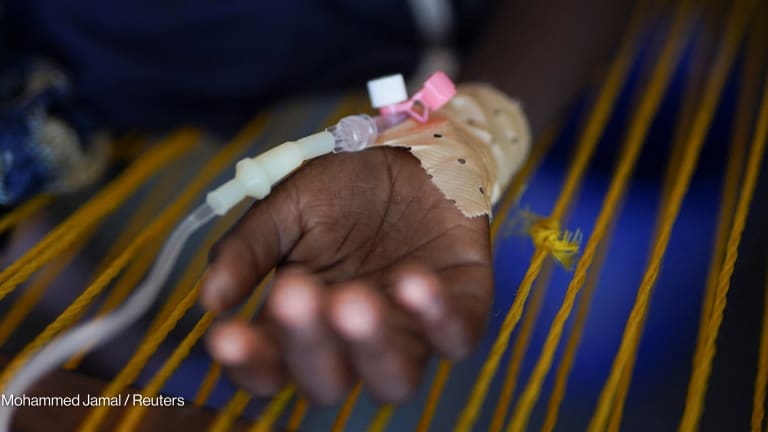
ALICANTE, Spain — A total of $3.6 billion is needed between 2020 and 2030 to establish basic water services in health care facilities in the 47 least developed countries, according to a report by the World Health Organization and UNICEF — marking the first time a price tag has been put on the issue, according to Bruce Gordon, unit head of WASH at WHO.
Although the figure is a preliminary estimate, more detailed figures are expected to be released next year.
“It’s a very manageable, modest figure,” Gordon said, adding that it could help ignite action at the international level.
One in 4 health care facilities worldwide still lack access to basic water facilities, leaving 1.8 billion people at a heightened risk of illness and infection. In low- and middle-income countries, an average of 15% of patients acquire at least one infection while in acute care.
“[COVID-19] has been the wake-up call to all of us that we can’t ignore these fundamentals of public health and clean, safe care any longer.”
— Helen Hamilton, senior policy analyst, WaterAid“Having reliable water supply and wastewater systems in health care facilities is critical to the service being provided,” said Zoe Pacciani, Uganda country director at Engineers Without Borders USA.
Based on EWB’s work in Malawi and Uganda, Pacciani said that $3.6 billion seems a “fairly accurate” estimate and that it will help the sector see WASH in health care facilities as attainable.
Gordon argued that the equivalent of $0.30 per capita per year was a small amount in the bigger picture of Sustainable Development Goals funding. Least-developed country governments collectively spent $10 per capita on health in 2018.
Helen Hamilton, senior policy analyst at WaterAid, which contributed to the report, said the estimate showed it was “one of the best buys in public health.”
“This report is the rallying cry, and COVID [COVID-19] has been the wake-up call to all of us that we can’t ignore these fundamentals of public health and clean, safe care any longer,” she said.
In 2018, the United Nations secretary-general issued a global call to action “to elevate the importance of and prioritize action on WASH in all health care facilities.”
And last year, WHO approved a resolution calling for member states to take action by developing national road maps and setting targets. Only one-third of the countries that responded had costed road maps in place.
To push the issue forward, the report calls for more “catalytic” funding, technical support, and domestic resourcing. By tackling antimicrobial resistance, reducing infections, and allowing health workers to spend more time offering patient care rather than searching for water, it suggests a potential return of $1.50 for every dollar invested.
“We know that it will often take just one year for investment in WASH to pay for itself and produce savings for every dollar that’s invested thereafter,” Hamilton said, calling it “a ‘no regrets’ investment.”
The hospitals where doctors can't wash their hands
"Can you imagine being told ‘oh there’s an outbreak but you can’t wash your hands?’” This is the situation that workers in 55% of health centers in lowest-income countries are facing.
Ideally, investments should be coming from public health expenditure, Gordon said, but often there is no line item for WASH in national health budgets. The report recommends implementing costed national road maps with appropriate financing while integrating WASH into regular health sector budgeting.
Any investments made by external donors in health should also have a WASH element, Hamilton said.
“The main thing around this report is that it’s actually taken up by the health sector, health professionals, and institutionalized within health programming. In as much as folks in the WASH sector … are shocked at the lack of WASH in this setting, it’s the health sector people that really need to take it on,” Gordon said. They must advocate for WASH to be budgeted for because, while it may not necessarily be the first thing that comes to mind, it is critical to all their work, he added.








